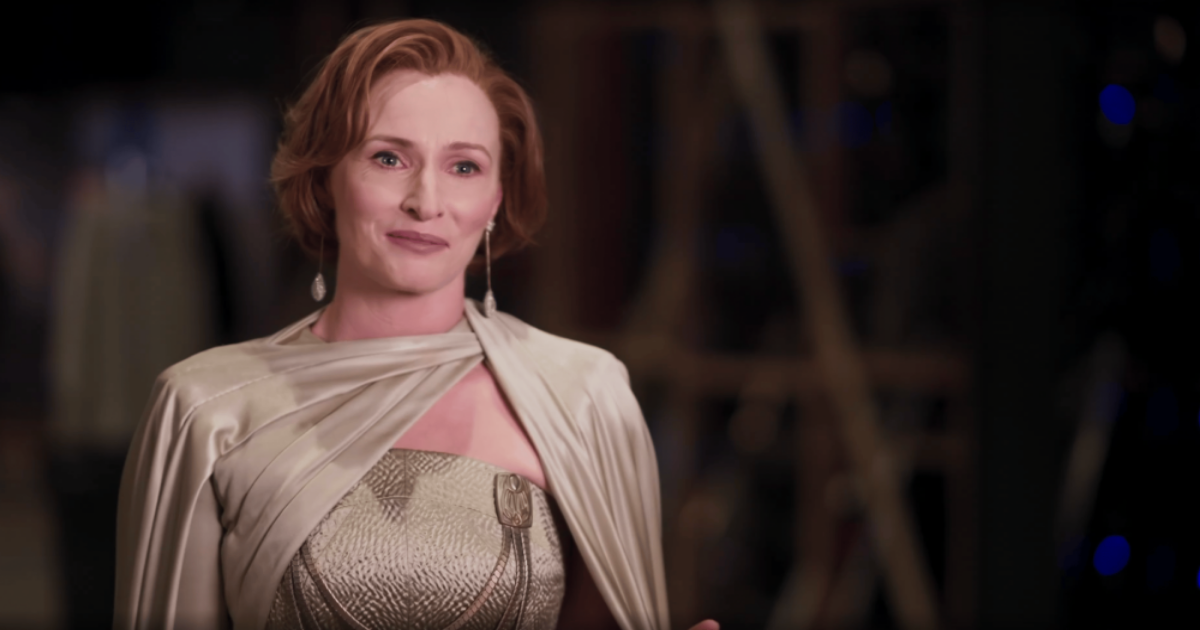SPOILER ALERT: This article contains spoilers for the first three episodes of “Andor” Season 2, now streaming on Disney+.
Welcome to the rebellion, Mon Mothma.
Genevieve O’Reilly’s “Star Wars” senator got an abrupt awakening to the harsh realities of staging a rebellion during the Season 2 premiere of “Andor.” Across the first three episodes, Mon hosts a lavish wedding for her young daughter Leida (Bronte Carmichael) to the son of shady businessman Davo Sculdun (Richard Dillane). In Season 1, Mon and Davo negotiated a deal to give her a loan so that she can funnel money to the rebels in exchange for arranging Leida’s marriage. Everything gets complicated when Mon’s old flame Tay Kolma (Ben Miles), a wealthy banker who’s wrapped up in the scheme, slyly asks for a bribe to keep his business afloat and stay quiet about the financial arrangement.
Amid the chaos of the wedding, her daughter despising her and her husband thinking she’s having an affair with Tay, Mon faces a terrible decision: pay Tay off or … eliminate him with help from Luthen Rael (Stellan Skarsgard). In the end, Mon can’t risk Tay ruining her rebel plans, so Luthen organizes a plot with his spy Cinta Kaz (Varada Sethu) to kill him. A disguised Cinta pretends to be Tay’s new driver and whisks him away at the end of the wedding, likely never to be seen again. During all this, Mon has a few drinks and dances the night away to some rocking wedding tunes, but O’Reilly explains how there is a lot on her mind during the closing scene.
What is extraordinary about those first three episodes is they are a lens into her family culture. It’s such an interesting piece that I would never have expected to explore within “Star Wars” — these intricate family dynamics and relationships. The mother-daughter scenes are beautiful and heart-breaking, and the scenes with her husband feel so real. There’s a moment where it really shifted what I might’ve thought they were. He gives a speech at the wedding, and you think maybe they were happy at one point. Their choices and ideologies take them far apart from each other. In the scene just before the wedding, her daughter is brutal to her and makes it very clear that she is is taking oppositional choices to what her mother has done. It’s pretty painful.
Then you have Luthen there at the wedding, and her friend Tay, who has been such an ally in Season 1. He was so instrumental in bringing everything together, and now he’s a bit frayed around the edges. He’s a bit loose, and he becomes this threat. There’s that scene with Luthen where he really calls her out on her perhaps romanticism of what this rebellion is and that she can have everything. But of course, she can’t. He calls her on that, and she tacitly agrees that her friend will be murdered. It haunts her forevermore. That’s a really important threshold that we see her take that choice, that rebellion comes first.
She’s wrestling with the demons within her at that moment. She’s using the facade of this cultural celebration to release her body, in a way, to stop herself from screaming in pain. The only two people who really know what’s going on are the audience and Mon Mothma. To everyone else, to that lens, she’s just gotten a bit messy at a wedding. But we understand she’s wrestling with the chaos that’s inside her own head.
That was in Season 1 as well. That piece of music I think was in the brothel scene in Season 1 and also in one of Mon Mothma’s party scenes. This is like the mega-hit mix that we have. It feels like it’s part of the cultural fabric that galaxy at that time. She’s able to really release herself within that. You can feel that clash of old and new within those scenes with that speech Skuldun gives with that really gauche piece that he is giving as this performative gift. You can feel her writhing inside against this gauche-ness. That crescendo of that dance piece really allows for us to witness what she’s releasing in this episode. To dance as Mon Mothma, and wrestle her out of the structure of that calm aesthetic was such a gift.
Rebellion has many faces. Each are important and painful, but they are different facets of that one idea. Tay’s murder haunts her forever, because she understands that she is a part of that. It just breaks that romantic idea that you could get that far into rebellion and not have blood on your hands. That was her childhood friend. It breaks something deep in her. It’s important to show that everything for all of these characters comes with a cost. It all requires courage, but it doesn’t come for free. It all comes intertwined with pain. Rebellion is not pretty.
This interview has been edited and condensed.
